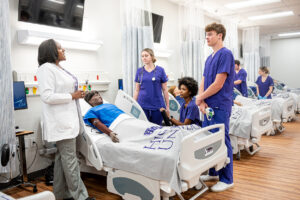The health care industry is booming. Medical advancements are made every day, and the need for health care professionals is at a rapid increase.
In fact, according to U.S. News, nearly 40 of the top 100 jobs in the country are in the health care field.
High Point University has built programs that address these needs. The Congdon School of Health Sciences and the Fred Wilson School of Pharmacy at HPU prepare students for a promising path as physician assistants, pharmacists, exercise scientists, athletic trainers, physical therapists, nurses and more.
And HPU’s health care programs continue to grow as HPU has proposed a School of Optometry and works to welcome its first class of dental students and builds the new Workman School of Dental Medicine.
If you’re looking for a way to jump-start your future, consider these five reasons to pursue a career in health care — starting with an education at HPU:

1. It’s Rewarding
Many health care providers agree that the life-changing and life-saving potential of their job makes it all worth it.
“The greatest gift one can give is to improve someone’s quality of life,” says Provost Dr. Daniel Erb. “You can do that in a number of ways. To improve the health or the function of an individual is truly a gift and an amazing thing to be able to do.”
Most students cite “helping others” as a primary reason for entering the health care field. There’s a quote in the hallway of the Department of Physician Assistant Studies that reminds students of this every day. It reads: “It’s about the people we serve. Your patients are as valuable as family. Remember this is a calling as much as it is a profession.”
2. The Flexibility
The need for health care is universal. A career in this industry allows room for travel and mobility to move from one area to the next, since you can do your job practically anywhere in the world.
Specializing in a certain area allows you to hone your passion and work wherever you want.
“PAs work in all areas of medicine, including primary care, family medicine, emergency medicine, surgery and psychiatry,” says Dr. Linda Sekhon, chair of the Department of Physician Assistant Studies at HPU.
 3. Teamwork
3. Teamwork
The role of health care providers today looks much different than it used to. Pharmacists, physicians and physical therapists used to practice in silos.
But times have changed. Today, health care is a collaborative team sport of patient-focused care. Providers of various specialties interact daily, and their patient’s well-being depends on their ability to communicate effectively.
At HPU, students receive a cross-disciplinary education. A physician assistant student takes classes with athletic training and pharmacy majors. Through that, students learn how to navigate working in a team.
“There’s so much more to health care than meets the eye,” says Associate Professor and Director of Introductory and Longitudinal Patient Experiences Dr. Phillip Stafford. “We all serve a niche, and we bring something that meshes with the other professions because the point is to work together.”
 4. Increasing Demand
4. Increasing Demand
A growing and aging population requires more people who can provide quality health care.
When students in HPU’s health sciences and pharmacy schools graduate, they’ll enter the workforce with many job opportunities available throughout the world. In fact, the Bureau of Labor Statistics show these fields are expected to grow up to 34% by 2024 – much faster than average for other occupations.
As the BLS reports, “Health care occupations will add more jobs than any other group of occupations. This growth is expected due to an aging population and because federal health insurance reform should increase the number of individuals who have access to health insurance.”
 5. It’s Dynamic
5. It’s Dynamic
In health care, no day is the same.
The field is very dynamic; health care providers work in office settings, emergency rooms, retail pharmacies and even on the battlefield. It provides the opportunity to interact with a broad range of people, learning new skills every day.
“The continued globalization of health care will be demanding, competitive, turbulent, complex and uncertain,” says Dr. Scott De Rossi, founding dean of the Workman School of Dental Medicine. “I am motivated to prepare our students in every way, to render value and to advance better health locally and globally in an ever-changing world.”
Times are changing. While we don’t know what the health care industry — or the world — will look like in 10 years, what we do know is this: There will always be a demand for health care workers who can grow and adapt. And the ability of HPU graduates to tackle it is certain.
 BONUS: A Life Skills Advantage
BONUS: A Life Skills Advantage
Industry leaders are looking for employees who will add value to their organizations the moment they come on board. That’s why HPU places a strong emphasis on life skills. In a world where technology changes daily, technical skills won’t take students through a lifelong career. But life skills — the ability to collaborate, communicate, solve problems and create relevant value in a complex situation — are the skills that serve graduates well for the rest of their lives.
As with many other career fields, the health care industry requires life skills development, also called “soft skills,” to aid in continuous career progression. And patients appreciate working with clinicians that have a higher level of emotional intelligence, adaptability and communication skills. HPU answers this call by graduating well-rounded students ready to adapt to an ever-changing health care market.

HPU’s Health Care Legacy
High Point University recognizes the rapid growth of the health care industry by continuing the university’s legacy of health care education. The university continues to pursue new programs and enhance existing programs that support the ever-changing complexities of health care. Led and designed by experts, HPU’s health care programs offer the most innovative technologies and teaching methods. Built on the foundation of success, these programs have seen tremendous growth, achieved academic prestige and produced graduates who are filling crucial health care positions.
Graduates in High Point University’s departments of Physical Therapy, Physician Assistant Studies and Athletic Training received 100% pass rates on their respective national board exams.
- The Department of Physical Therapy’s inaugural Class of 2020 received an ultimate pass rate of 100% on the National Physical Therapy Exam (NPTE), four points above the national average.
- Class of 2020 graduates in the Department of Physician Assistant Studies received a top score on the Physician Assistant National Certifying Examination (PANCE). The program first-time taker pass rate for the Class of 2020 was 100%, which is five points higher than the national average for first-time takers, on the PANCE for 2020.
- The Master of Science in Athletic Training (MSAT) Class of 2021 scored a perfect pass rate on the National Board of Certification (BOC) examination. HPU’s 100% first-time pass rate far exceeded the three-year aggregate national average of 72.
